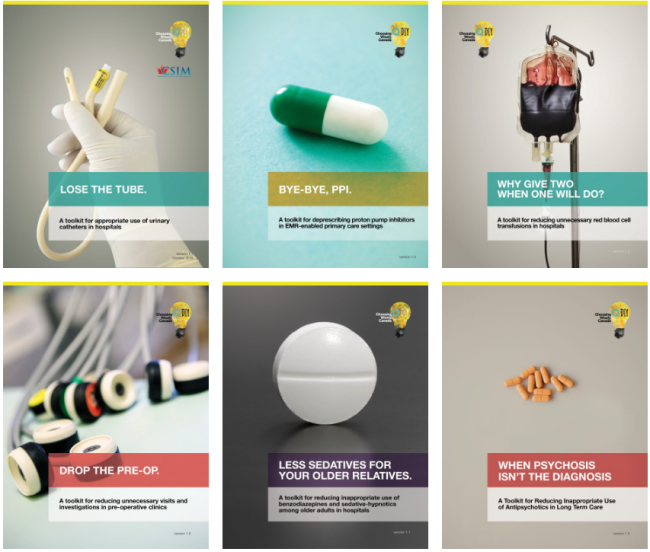You can now add Healthify as a preferred source on Google. Click here to see us when you search Google.
Choosing Wisely for healthcare providers
Key points about Choosing Wisely
- Choosing Wisely is an international movement aiming to identify commonly performed interventions with limited evidence or benefit and reduce the unintended harm caused by medical care.
- Find information on choosing wisely, how to engage with patients and toolkits to help you when reviewing your patients needs.

Choosing Wisely is an initiative that started in the States and has now spread across the globe as more countries recognise the value of encouraging both patients and clinicians to engage in conversations about unnecessary tests, treatments and procedures.
It comprises lists that are created by national medical specialty societies and represent specific, evidence-based recommendations that clinicians and patients should discuss. Each list provides information on when tests and procedures may be appropriate, as well as the methodology used in its creation.
Choosing Wisely recommendations are not prescriptive but are “intended as guidance to start a conversation about what is appropriate and necessary. As each situation is unique, healthcare professionals and patients should use the recommendations to collaboratively formulate their own appropriate healthcare plan together”.
A recent report ‘Unnecessary Care in Canada’ produced by the Canadian Institute for Health Information and Choosing Wisely Canada and released in April 2017 has found that up to 30% of selected medical tests, treatments and procedures in Canada are potentially unnecessary. This leads to significant waste in terms of patients’ time, system resources and costs, while also leading to increased wait times and patient harm.1
We tend to think that screening for various risk factors or diseases leads to better outcomes, however this is not always the case. The following video by Dr Mike Evans explains some of the dilemmas that arise with regard to widespread screening.
(DocMikeEvans, 2015)
Choosing Wisely NZ was launched in December 2016 and is being led by the Council of Medical Colleges in partnership with a range of organisations including Health Quality & Safety Commission and Consumer NZ.
The video includes stories from health care consumers along with advice from Dr John Bonning, president of the Australasian College for Emergency Medicine, chair of the Council of Medical Colleges and an emergency physician at Waikato Hospital.
(The Health Quality & Safety Commission, NZ, 2021)
- Don’t delay the introduction of solid/complementary foods to infants – ASCIA Infant Feeding Advice recommends early introduction of solid foods to infants, from 4-6 months old. Read more(external link)
- Don’t request duplex compression ultrasound for suspected lower limb deep venous thrombosis in ambulatory outpatients unless the Wells Score (deep venous thrombosis risk assessment score) is greater than 2, OR if less than 2, D-dimer assay is positive. Read more(external link)
- Don’t request imaging for acute ankle trauma unless indicated by the Ottawa Ankle Rules (localised bone tenderness or inability to weight-bear as defined in the Rules). Read more(external link)
- Don’t perform imaging for patients with non-specific acute low back pain and no indicators of a serious cause for low back pain. Read more(external link)
- Do not perform surveillance urine cultures or treat bacteriuria in elderly patients in the absence of symptoms or signs of infection. Read more(external link)
- Do not perform population-based screening for Vitamin D deficiency. Read more(external link)
- Do not routinely test and treat hyperlipidemia in those with a limited life expectancy. Read more(external link)
To date, 18 faculties or specialist groups have identified their top five investigations or treatments for their area, that should be questioned, and published a list of evidence-based recommendations and resources to assist colleagues and patients.
View all the NZ-based recommendations(external link)
Choosing Wisely NZ encourages patients to communicate with their health professional. As a guide, they recommend patients ask the following 4 questions regarding their test, treatment or procedure:
- Do I really need this test or procedure?
- What are the risks?
- Are there simpler, safer options?
- What happens if I don’t do anything?
To facilitate clinician/patient discussion, Choosing Wisely NZ has created a number of patient & consumer resources to support some of their recommendations. These are plain language summaries that gives a brief description of the clinical issue, the evidence, the risks and the options.
Choosing Wisely has produced a series of resources to guide you, from a starter kit, to how to develop and implement recommendations, measure the impact of your project and more.
Video about how Choosing Wisely recommendations can be applied to improve and benefit discussions around patient diagnosis, treatment and other important topics.
(Choosing Wisely, Canada, 2014)
Video about the benefits of health professionals and members of the public talking more about health services so that every decision is beneficial to the patient and ensures the highest quality care is provided.
(Choosing Wisely, Canada, 2014)
Sometimes having more care can lead to increased risks and potentially cause harm. In this video, several health professionals talk about the importance of choosing wisely and thinking carefully about the risk and benefit of each test or procedure rather than just ticking a box.
Video: Choosing Wisely Canada - More Medicine is Not Always Better Medicine
(Choosing Wisely, Canada, 2014)
Created by Professor James McCormack, University of British Columbia, the following video provides a lighthearted, yet relevant summary of examples where medicine can do more harm than good.
Click on this link(external link) and watch 'Choosing Wisely'.

The Canadian Choosing Wisely team have created some useful toolkits to focus on specific areas. Here are three examples. Visit the website(external link) for more details.
To read more about the Choosing Wisely campaign:
- Unnecessary Care in Canada(external link) Canadian Institute for Health Information
Credits: Thanks to Choosing Wisely NZ for permission to reuse some content to create this page.
Reviewed by: Healthify editorial team. Healthify is brought to you by Health Navigator Charitable Trust.
Last reviewed:
Page last updated:


